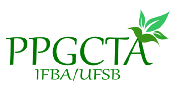Banca de DEFESA: LOUISE GOMES PASSOS
Uma banca de DEFESA de MESTRADO foi cadastrada pelo programa.DISCENTE : LOUISE GOMES PASSOS
DATA : 31/10/2019
HORA: 09:00
LOCAL: Campus Sosígenes Costa - Sala Taperapuã 2 - Link: https://mconf.rnp.br/webconf/csc-1
TÍTULO:
Ethnobotanical Knowledge of the Divino Espírito Santo Community in the Vale Verde District, Bahia, Northeast Brazil
PALAVRAS-CHAVES:
Atlantic Forest. Ethnobotany. Traditional Community.
PÁGINAS: 80
GRANDE ÁREA: Outra
ÁREA: Ciências Ambientais
RESUMO:
The knowledge accumulated by traditional communities is of fundamental importance for the maintenance of biological diversity, ensuring the use and rational management of natural resources. Thus, the present work aimed to make a survey through traditional knowledge, through a descriptive ethnobotanical perspective of plant species from the original territory of the Atlantic Forest used in different categories in a traditional community of the district of Vale Verde (BA). The first stage of the work dealt with the access to ethnobotanical knowledge of the local population. To this end, 13 field visits were carried out including 07 interviews with the community between April / 2018 and July / 2019. Research methods such as participant observation, informal conversations, semi-structured interviews, snowball, free listing and guided tour were used. The analysis was subsidized through the Microsoft Office Excel® 2007 program, being performed the descriptive statistics from simple tabulation, distribution of percentages, tables and figures. People identify and/or use more than 80 species of plants distributed into 09 usage categories: medicinal, ornamental, food, construction/woodworking, household use, insect repellent/insecticide, commercial, mystical use and cosmetic. Twenty-four botanical families were identified, Lamiaceae being the most cited. The part of the vegetable that had the highest significance regarding the category of use was the leaf, being mostly used in home medicine. Mostly, the place of purchase of plants for use by the population is through backyards, totaling 97.56%, followed by Mata (4.87%). It is discussed how natural resources are used and the implication of this in the conservation of the Atlantic Forest. The project shows the relevance of ethnobotany knowledge because it is perceived that the understanding of the relationship between botany and the human being serve as a way of awareness and contribution to the maintenance, environmental preservation and sustainable use of the Atlantic Forest from the knowledge.
MEMBROS DA BANCA:
Externo ao Programa - 1694002 - ANGELA MARIA GARCIA
Interno - 034.751.739-05 - CAROLINA WEBER KFFURI - UFSB
Interno - 1782304 - JAILSON SANTOS DE NOVAIS
Presidente - 1553832 - JORGE ANTONIO SILVA COSTA



